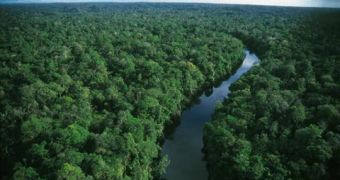During this year's meeting of the Association for Tropical Biology and Conservation in Bonito, Brazil, ecologist Fernanda Michalski drew attention to the following issue: people who own rather small properties in the Amazon region are not very keen on abiding by conservation laws.
To be more precise: whereas Brazil's Forest Code requires that private holdings in the area maintain an 80% forest coverage – regardless of their total surface – local landowners sometimes end up cutting more trees than they are officially allowed.
As one can easily guess, Amazon's wildlife is severely affected by these small-scale deforestations, especially given the fact that they more often than not lead to deserted patches springing up in the middle of what should be an extremely luxurious vegetation.
This means that Amazon's animals can no longer move freely about the forest, something that obviously interferes with their hunting and breeding habits.
Apparently, mammals, birds and reptiles are all affected by the locals' going just one extra mile in their attempt to gain more land for themselves and their families.
Mongabay reports that Fernanda Michalski argued loud and clear that “Degradation caused by deforestation patterns in these small properties have a disproportionally large impact of Amazon forest conservation.”
Interestingly enough, it seems that, over the past few years, major deforestation campaign in the Amazon region have largely ended, as environmental groups and high officials worked together to keep the forests there as safe as possible.
However, given the fact that they are both numerous and have no trouble in going unnoticed, these small-scale perpetrators are highly unlikely to be caught any time soon and kept from doing more harm to the environment.
As far as we are concerned, Amazon's authorities should perhaps focus on getting these people to understand that, even if not at all impressive when taken separately, the deforestations they are responsible for eventually amount to considerable damage being inflicted on local ecosystems.

 14 DAY TRIAL //
14 DAY TRIAL //